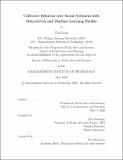| dc.contributor.advisor | Alex Pentland. | en_US |
| dc.contributor.author | Leng, Yan | en_US |
| dc.contributor.other | Program in Media Arts and Sciences (Massachusetts Institute of Technology) | en_US |
| dc.date.accessioned | 2020-09-15T22:01:13Z | |
| dc.date.available | 2020-09-15T22:01:13Z | |
| dc.date.copyright | 2020 | en_US |
| dc.date.issued | 2020 | en_US |
| dc.identifier.uri | https://hdl.handle.net/1721.1/127502 | |
| dc.description | Thesis: Ph. D., Massachusetts Institute of Technology, School of Architecture and Planning, Program in Media Arts and Sciences, May, 2020 | en_US |
| dc.description | Cataloged from the official PDF of thesis. | en_US |
| dc.description | Includes bibliographical references (pages 171-186). | en_US |
| dc.description.abstract | Individuals form network connections based on homophily; individuals' networks also shape their actions. Pervasive behavioral data provides opportunities for a richer view of the decisions on networks. Yet, the increasing volume, complex structures, and dynamics of behavioral data stretch the limit of conventional methods. I develop mathematical modeling (e.g., machine learning, game theory, and network science) and large-scale behavioral data to study collective behaviors over social networks. My dissertation will tackle this area in four directions, revolving around the intricate linkage between individuals' characteristics, actions, and their networks. First, I empirically investigate how social influence spreads over networks using two massive cell phone data, and theoretically model how do individuals aggregate information from local neighbors. Second, I study how to leverage influential nodes for selective network interventions (e.g., marketing and political campaigns), by proposing a centrality measure going beyond network structures. Third, I build a geometric deep learning model to infer individual preferences and make personalized recommendations to utilize noisy network information and nodal features effectively. Last, given that the network is essential, I develop a framework to infer the network connections based on observed actions, when networks are unavailable. My thesis provides building blocks for further network-based machine learning problems integrating nodal heterogeneity and network structures. Moreover, the findings on human behaviors and frameworks developed in my thesis shed light on marketing campaigns and population management. | en_US |
| dc.description.statementofresponsibility | by Yan Leng. | en_US |
| dc.format.extent | 209 pages | en_US |
| dc.language.iso | eng | en_US |
| dc.publisher | Massachusetts Institute of Technology | en_US |
| dc.rights | MIT theses may be protected by copyright. Please reuse MIT thesis content according to the MIT Libraries Permissions Policy, which is available through the URL provided. | en_US |
| dc.rights.uri | http://dspace.mit.edu/handle/1721.1/7582 | en_US |
| dc.subject | Program in Media Arts and Sciences | en_US |
| dc.title | Collective behavior over social networks with data-driven and machine learning models | en_US |
| dc.type | Thesis | en_US |
| dc.description.degree | Ph. D. | en_US |
| dc.contributor.department | Program in Media Arts and Sciences (Massachusetts Institute of Technology) | en_US |
| dc.identifier.oclc | 1193026890 | en_US |
| dc.description.collection | Ph.D. Massachusetts Institute of Technology, School of Architecture and Planning, Program in Media Arts and Sciences | en_US |
| dspace.imported | 2020-09-15T22:01:13Z | en_US |
| mit.thesis.degree | Doctoral | en_US |
| mit.thesis.department | Media | en_US |
